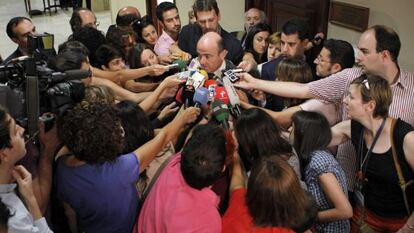ECB urged to take the reins in euro crisis
Risk premium eases for first time in 10 sessions to 611 basis points European Commission approves bailout of up to 100 billion euros for Spain's banks

The Spanish government on Wednesday continued to try to drum up support from its European partners for direct intervention to ease the intense pressure on its sovereign debt and avoid having to seek a full bailout.
After meeting with German Finance Minister Wolfgang Schäuble on Tuesday, Spanish Economy Minister Luis de Guindos called in on his French counterpart, Pierre Moscovici, on Wednesday. The statements issued after both meetings contained the same message: that the markets' assault on Spanish debt was not justified and that the decisions taken at the European summit at the end of last month on moves toward a banking union and greater economic and monetary union should be implemented as soon as possible.
In view of the ECB's apparent reluctance to renew its purchases of bonds, Spain is keen on empowering the European Union's rescue funds to buy sovereign debt in the secondary market.
"We believe that the current level of interest rates prevailing in the sovereign debt markets does not reflect the fundamentals of the Spanish economy, its growth potential and the sustainability of its public debt," the joint statement with Moscovici read.
"We also reaffirmed our commitment to fully and rapidly implementing the decisions made by the European Council on June 28-29. Our common strategy for the stability of the Euro area includes the adoption, by the end of this year, of a single supervisory mechanism for banks of the Euro area, involving the ECB; we expect proposals by the Commission by September and commit to a swift negotiation," the statement continued.
Spain's risk premium touched euro-era record highs on Wednesday but comments by ECB Governing Council member Ewald Nowotny to the effect that the European Stability Mechanism (ESM), Europe's permanent rescue fund, should be given a banking license helped ease some of the pressure.
With a banking license, the ESM would be able to borrow from the ECB, thereby increasing its firepower to help shore up financially distressed euro-zone members.
"I think there are pro arguments for this," Nowotny, who is head of Austria's central bank, told Bloomberg.
"The idea of making the ESM a bank is a game-changer," Bloomberg quoted Vincent Chaigneau, who is global head of interest-rate strategy at Société Générale, as saying. "The ECB has been against ideas like this. It is probably possible; the question is whether it can get enough political support."
The yield on the Spanish benchmark government bond hit 7.747 percent early on in Wednesday's session, the highest level since October 1996. That pushed the spread with the German equivalent to 649 basis points. However, the risk premium subsequently eased for the first time in 10 sessions to 611 basis points, compared with Tuesday's closing level of 638 basis points. The yield on 10-year bonds was at 7.375 percent in late trade, while the yields of shorter maturities also fell.
Nowotny's remarks also gave a boost to stocks. The blue-chip Ibex 35 closed up 0.82 percent at 6,004.90 points.
The European Commission on Wednesday approved a bailout of up to 100 billion euros for Spain's banks but concerns remain about the funding requirements of Spain's cash-strapped regions, which have been cut off from the markets.
Catalonia on Tuesday joined Valencia and Murcia in declaring it would seek financial assistance from the central government. Valencia says it needs over 2 billion euros, while Murcia wants 300 million. Catalonia, which is Spain's economic powerhouse, did not give a figure for the amount of aid it requires.
The government plans to endow the so-called Regional Liquidity Fund with 18 billion euros, six billion of which is due to come from the state lottery company. That means the Spanish Treasury will have to tap the markets for a further 12 billion euros, while more funding will be required to cover the relaxed deficit target of 6.3 percent for this year, a percentage point more than the figure originally agreed with Brussels.
Tu suscripción se está usando en otro dispositivo
¿Quieres añadir otro usuario a tu suscripción?
Si continúas leyendo en este dispositivo, no se podrá leer en el otro.
FlechaTu suscripción se está usando en otro dispositivo y solo puedes acceder a EL PAÍS desde un dispositivo a la vez.
Si quieres compartir tu cuenta, cambia tu suscripción a la modalidad Premium, así podrás añadir otro usuario. Cada uno accederá con su propia cuenta de email, lo que os permitirá personalizar vuestra experiencia en EL PAÍS.
¿Tienes una suscripción de empresa? Accede aquí para contratar más cuentas.
En el caso de no saber quién está usando tu cuenta, te recomendamos cambiar tu contraseña aquí.
Si decides continuar compartiendo tu cuenta, este mensaje se mostrará en tu dispositivo y en el de la otra persona que está usando tu cuenta de forma indefinida, afectando a tu experiencia de lectura. Puedes consultar aquí los términos y condiciones de la suscripción digital.








































